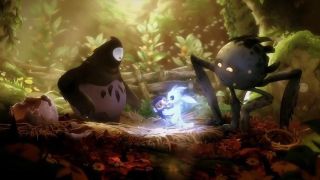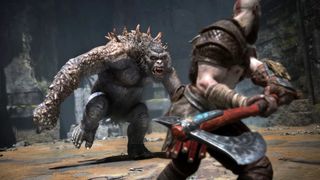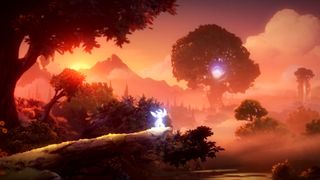Xbox One games aren’t as revered as most PS4 exclusives, but they’re much better
Opinion: Variety is the spice of life

Microsoft has found it tough this generation. From a disastrous launch to painfully misconstrued messaging, the Xbox One got off to a sluggish start and hasn’t been able to catch up with Sony’s PS4 since. And yet it’s the console I've played the most by some margin because Xbox has a better choice of games.
Before you pick up your pitchforks and light your torches, hear me out. Xbox has certainly struggled to create compelling, critically-acclaimed exclusives – there’s no denying that. Middling Metacritic scores have accompanied many of Microsoft’s first-party efforts, with scores ranging from the low sixties and often topping out at the mid eighties, and there have been more than a few missteps with certain franchises either being cancelled or released in a shoddy state. Not great, then.
But the sheer variety of Microsoft’s first-party output, in tandem with the success of Xbox Game Pass, has turned its search to find the next big hit into one of its biggest strengths – there’s a breadth of unique titles on offer.
Same old Sony

Compare that to Sony, however, and it’s a very different story. Since the PS4 launched, Sony’s first-party studios have committed to creating exclusive narrative-driven, single-player games. From the graphically sublime God of War to the spectacular web-slinging Spider-Man, Sony has certainly delivered on this objective, and then some.
Few would argue, then, that these games are nothing short of excellent, but here’s where the problem lies. It honestly feels like that’s the only thing Sony makes anymore.
Here’s a small selection for context: God of War, Spider-Man, Days Gone, Horizon: Zero Dawn, Uncharted 4, The Last of Us 2, Ghost of Tsushima, The Order 1886 and InFamous: Second Son. When did Sony’s games become so… homogeneous?
Each Sony first-party exclusive game is yet another take on the same cookie-cutter formula which has, admittedly, given Sony incredible commercial and critical success. But I remember a time when Sony took risks, and wasn’t afraid to be the outlier, like with the recently released Dreams. PlayStation used to be home to the bonkers, bizarre and the quirky – now, though, it seems Sony is only willing to roll the dice on the odd indie title, or possibly a PSVR game. It’s even more frustrating when you consider Sony’s unassailable market share – why can’t they try something different?
Get daily insight, inspiration and deals in your inbox
Get the hottest deals available in your inbox plus news, reviews, opinion, analysis and more from the TechRadar team.
Sony won’t be changing its approach anytime soon, either. The company seems steadfast in its goal to create more of the same for PS5. Herman Hulst, head of Sony PlayStation Worldwide Studios, has previously said, “we’re very committed to quality exclusives. And to strong narrative-driven, single-player games”.
Microsoft’s mixer

Microsoft, on the other hand, has tried to move the needle with mixed results. Strangely, the green team is frequently accused of only making Halo, Gears and Forza games, but that couldn’t be further from the truth. Yes, those franchises obviously have some pulling power with gamers, and there’s nothing wrong with using an established universe to give players a different experience. Two perfect examples of this are Forza Horizon and Gears Tactics - they’re both great games within their own right, despite being spin-offs of successful series.
Entirely different types of games, though? Microsoft has delivered plenty this gen, and they all vary wildly when it comes to genre and appeal. Sunset Overdrive is a criminally underrated third-person action game; Sea of Thieves has flourished into a compelling online multiplayer game; Ori and the Will of the Wisps is a superb Metroidvania; Forza Horizon 4 is a sublime racing sim/arcade hybrid; and Halo: The Master Chief Collection finally does justice to a beloved series.
That list isn’t exhaustive by any means, and not every game hits the mark (see: Bleeding Edge), but what it does show is the sheer diversity of Xbox One’s library of exclusive games and Microsoft’s willingness to experiment. A quick glance at Microsoft’s upcoming games only serves to prove my point, with Flight Simulator, Ever Wild and Grounded on the way, each of which is wholly different from one another. It’s refreshing to see compared to Sony’s saturated focus.
More to come?

With the success of Xbox Game Pass, which now has 10 million subscribers, Microsoft is free to create even more off-the-wall titles in an attempt to disrupt the market. Few can deny it’s anything but a fantastic service, and much like Netflix, the money from subscribers reduces the risk associated with each game Microsoft decides to back. Comparatively, Sony has a reported one million subscribers to its PS Now service.
Matt Booty, head of Xbox Game Studios, spoke to us about the benefits of Xbox Game Pass and how it’s influencing the company’s design decisions moving forward. “It has really freed us up from having to think about designing around a service or around a business model, and being able to just design the games that the team wants to work on,” said Booty.
For those who are desperate for Sony-style exclusives (read: narrative-driven single-player games), Microsoft went on a spending spree last year and purchased a number of high-profile studios and developed one of its own, The Initiative. The studios can not only chip in with games specifically for Xbox Game Pass, but create blockbuster ‘triple A’ exclusives too.
The question is, then, can Microsoft capture some of the single-player magic that Sony fans crave, while still offering a breadth of options for gamers on Xbox Series X? Ultimately we’ll have to wait and see, but as a gamer looking for the next new and exciting thing, the odds are high that Microsoft could have more to offer.
- Don't miss out: here are the best Xbox One games
Adam was formerly TRG's Hardware Editor. A law graduate with an exceptional track record in content creation and online engagement, Adam has penned scintillating copy for various technology sites and also established his very own award-nominated video games website. He’s previously worked at Nintendo of Europe as a Content Marketing Editor and once played Halo 5: Guardians for over 51 hours for charity. He is now an editor at The Shortcut.

